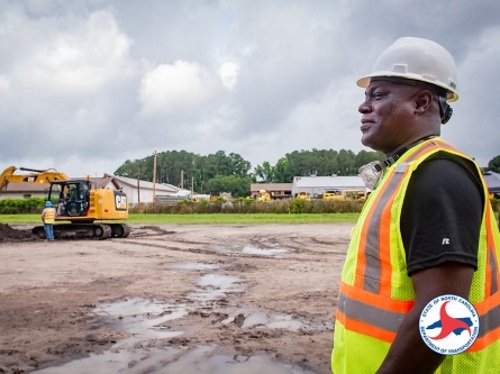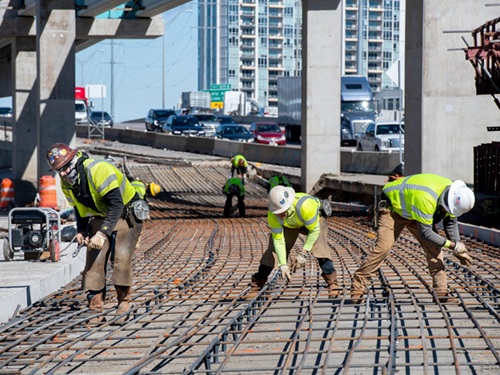The U.S. Department of Labor and U.S. Department of Transportation signed a memorandum of understanding on March 7 to promote the creation of union jobs favoring “underserved populations” with funds provided by the $1.2 trillion Infrastructure Investment and Jobs Act or IIJA, signed into law in November 2021.
[Above photo by the NCDOT]
This partnership will “ensure [IIJA] investments lead to good jobs and that workers have the training they need to access these jobs, especially women, people of color, and workers in communities who for too long have been left behind,” explained U.S. Secretary of Labor Marty Walsh in a statement.

“Together, our departments can provide resources and support that states and local communities need to rebuild our nation with good-paying jobs in the transportation and infrastructure sectors,” he said.
“We’re teaming up … to ensure that all Americans, especially those too often underrepresented in transportation and construction, have access to these high-quality jobs with a free choice to form a union,” added USDOT Secretary Buttigieg.
He noted that a similar effort to promote union jobs for “underserved populations” is contained within the recent $1.47 billion grant offering by the Federal Transit Administration to help modernize bus fleets and facilities across the country.

Five percent of each grant made with those funds – part of the FTA’s Low-No program – must be set aside for workforce development and training, Buttigieg said.
Both agencies also pointed out that their new partnership also aligns with the Department of Labor’s “Good Jobs Initiative,” launched in January, which seeks to improve “job quality” by creating access to good union jobs “free from discrimination and harassment,” for current workers and jobseekers.
The new partnership will also tap into “proven workforce development strategies,” such as the Labor Department’s registered apprenticeship program, to connect workers in underserved communities to modern day infrastructure and transportation jobs.
The American Association of State Highway and Transportation Officials also backed the idea of targeting new and future transportation and infrastructure jobs to underserved populations across the country.
In a 16-page policy white paper issued in October 2021, AASHTO said state departments of transportation are committed to providing recommendations to address “current and future needs” of the nation’s transportation workforce – including addressing equity barriers in terms of attracting and retaining individuals to transportation careers.
That includes finding ways to increase access to transportation and infrastructure jobs for “vulnerable or underrepresented populations” to creating pathways for students and individuals to secure work-based learning opportunities in the surface transportation sector.

Shawn Wilson, Ph.D. – secretary of the Louisiana Department of Transportation and Development – made sustaining such “pathways to equity” throughout the transportation industry, especially when it comes to jobs, one of his key emphasis areas for his one-year tenure as AASHTO’s 2021-2022 president.
In an October 2021 speech made following his election as AASHTO’s president, Wilson said that means embracing a “new normal” to ensure that hiring and promotions will be reflective of the many communities state DOTs serve, enriching the quality of state DOT workplaces while minimizing bias and challenging “unacceptable norms,” he said.
He added that it also means expanding project development and delivery benefits while ensuring that the negative effects of infrastructure are not concentrated in the communities that look differently than those of project decision makers.
Wilson pointed out that this “new normal” ensures that the contracting and exchange of resources involved in delivering infrastructure is equitable, helping lead to equitable employment in populations that are not well represented today’s state workforce.



